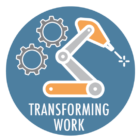
This post was originally published in October 2016. It is arguably more relevant today than then. As Farhad Manjoo details in a recent New York Times column coding will not be a high-paid occupation for much longer. As Kim Trent made clear in this post technical/occupation specific skills are not foundational to successful forty-year careers. That learning how to code is not the same as learning “skills like the ability to communicate, think critically, collaborate and create become increasingly vital for future careers. These are all skills that students hone in college.”
At the turn of the 20th century, two iconic leaders framed the debate about education in the black community: Harvard-trained intellectual and activist W.E.B. Dubois, who thought a classical education would best equip African Americans for lifelong success and Booker T. Washington, the most famous black man of the era and a staunch advocate of vocational education for African Americans.
I’ll pause here and confess that I have always been on Team DuBois, believing – as he did – that a college education is the black community’s most direct path to economic stability and intellectual advancement. That said, I will also concede that in the early 1900s, few African Americans could afford the luxury of a college education and that opportunities for black workers with a trade were plentiful.
My own paternal great-grandfather moved to Detroit in 1912 and landed a plum job as a skilled tradesman at Ford Motor Company. Both his son – my grandfather – and my uncle later comfortably raised families with good skilled trade jobs at Ford. My maternal grandfather, meanwhile, made a solid living as a welder at Detroit auto companies.
Trade jobs are not encouraging future careers
There’s no doubt that skilled trades jobs were a boon for African Americans in the 20th century. But this is 2016, and futurists have predicted that globalization and automation will make modern workers with transferable skills more valuable to employers. Skills like the ability to communicate, think critically, collaborate and create become increasingly vital for future careers. These are all skills that students hone in college.
That’s why I am highly skeptical of Rooted School, a high school that Jonathan Johnson proposed in New Orleans. The founder hopes to teach students skills like coding and software development so they can skip college and instead begin “high-paying” jobs right after high school. Johnson, who is still raising money to launch the school in 2017, told The Hechinger Report that he designed the school to diversify the ranks of the tech industry.
On its face, Johnson’s pitch may sound appealing. After all, tech jobs are high growth right now; an 18-year-old won’t sneeze at a $16 an hour wage for a coding job.
But mounting evidence shows that narrow educational schemes are the wrong path to prepare for ever-evolving 21st century careers. Today’s booming job field can be tomorrow’s career wasteland and workers who have only been trained to do one thing can find themselves out in the cold. For example, a 2015 Medium.com essay predicts the demise of software engineers. Dan Auerbach, a well-renowned software engineer himself, states that the increasing accessibility of software engineering platforms and the growing capability of software to create software will make human software engineers obsolete by 2060.
Transferable skills for a future career
There will undoubtedly be some who will think my view is elitist. Perhaps this is not surprising since I work for an organization that has consistently pushed higher education as a platform for life and career success. Not to mention that I’m a board member for a four-year university.
The truth is that I have deep respect for anyone who gets up every day to make an honest living. But I also think it is great folly to steer black children into narrow training for jobs that may or may not exist over the span of their careers instead of giving them broad skills that will help them adapt to changing work landscapes.
There’s a reason you rarely hear arguments for vocational education in wealthy suburban districts and it’s not because the parents there don’t want their children to succeed. Quite the opposite! Those districts offer college preparatory curricula because they know that in a rapidly-evolving economy, transferable skills are desirable not just to secure a short-term job but to build a lifelong career.
Encouraging future careers through educational reform
I recently re-watched a video of a panel discussion about the impact of educational reform on anti-poverty agendas that was sponsored by the Thomas B. Fordham Institute in 2014. Some of the panel’s speakers lifted up vocational education as a poverty eradication tool and wondered whether if it is unwise to continue to advocate for college prep curricula for all high schools.
On the panel, I found a kindred spirit in famed educator and civil rights activist Howard Fuller, who expressed his belief that all students should be given a rigorous secondary education that will prepare them to succeed in college and whatever career they choose. Like me, Fuller is skeptical of schools that track students into jobs instead of giving them access to a wide range of choices.
“Most of the people who talk about ‘kids don’t need to go to college,’ hell, they went to college,” Fuller said. “That’s where my problem starts right there. Why is it that it was ok for you [to go to college] but for these low-income kids it’s ‘all of y’all can’t go to college?’”
Why, indeed.







